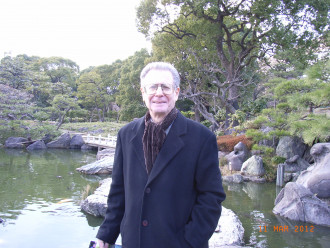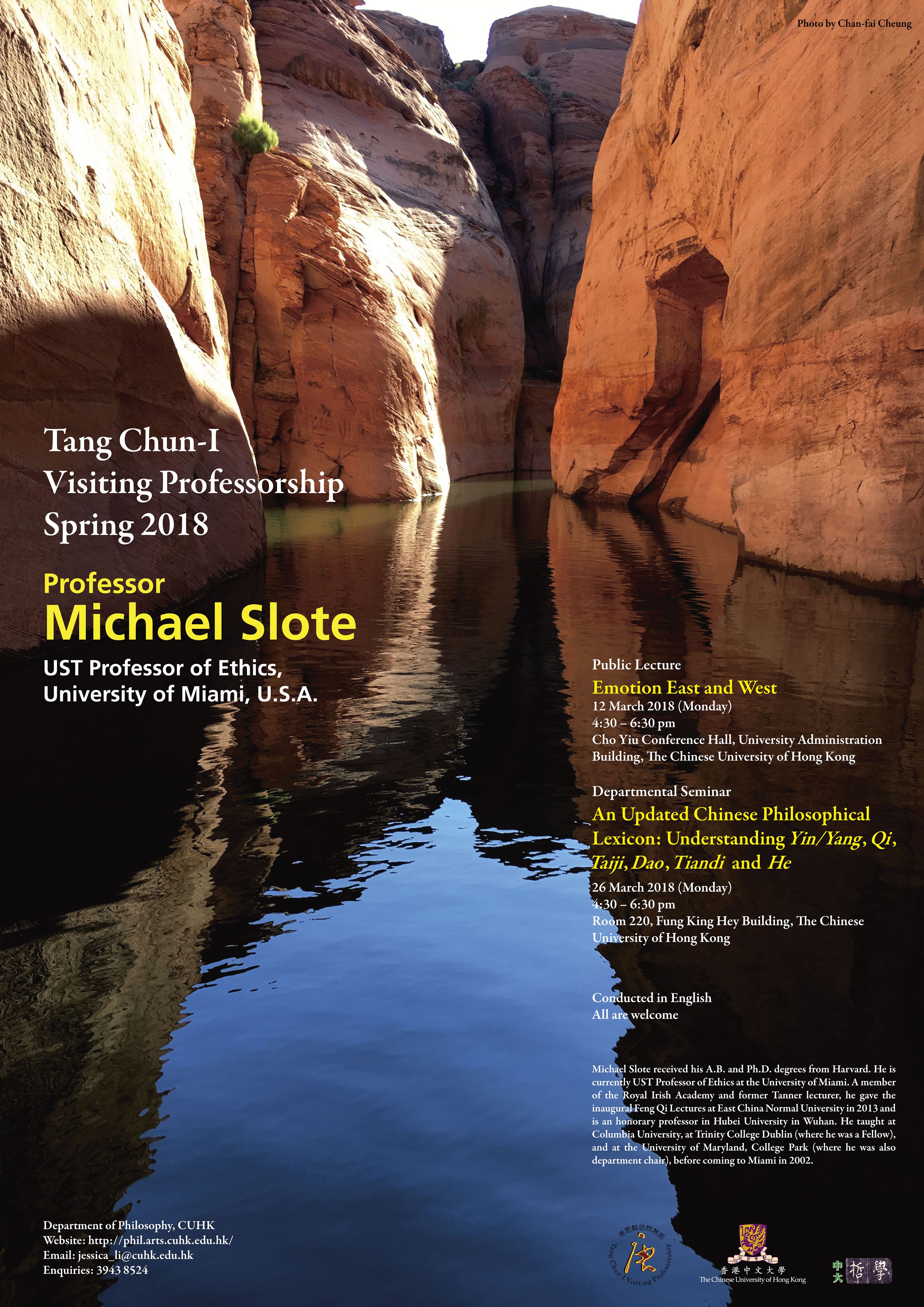
Michael Slote
Professor Michael Slote
UST Professor of Ethics, the University of Miami, U.S.A.
Michael Slote received his A.B. and Ph.D. degrees from Harvard. He is currently UST Professor of Ethics at the University of Miami. A member of the Royal Irish Academy and former Tanner lecturer, he gave the inaugural Feng Qi Lectures at East China Normal University in 2013 and is an honorary professor in Hubei University in Wuhan. He taught at Columbia University, at Trinity College Dublin (where he was a Fellow), and at the University of Maryland, College Park (where he was also department chair), before coming to Miami in 2002.
He is the author of several books and a large number of articles: most of these publications are in ethics, but in recent years his work has extended into epistemology, metaphysics, philosophy of language, and philosophy of mind. Most recently, his interest has turned to questions about the relationship between Western philosophy and Chinese philosophy. He has been exploring ways Western philosophy can be enriched through the incorporation of Chinese concepts like yin/yang, xin, dao, qi, taiji, tiandi, and he; and his book The Philosophy of Yin and Yang is due to be published, with side-by-side English and Chinese texts, by the Commercial Press later in 2018. His Tang Chun-I Lectures argue that yin/yang is the basis of mind/xin and its virtues and that yin/yang can also ground our understanding of nature and of the overall harmonies of the cosmos.
Emotion East and West

Abstract:
Chinese thought places far more importance on emotion than is typical in the West. Western languages talk about “mind” or its equivalents, whereas Far Eastern languages like Korean, Chinese, and Japanese speak about heart-mind, and the talk of mind presupposes that thinking can occur in the absence of any emotion, whereas the idea of heart-mind assumes no such thing. The Far Eastern understanding is more accurate to our psychology because it can be shown that every cognitive function of the mind requires believing something, and belief turns out to involve emotion.
If our functioning psychology requires emotion, then many Western ideas about ethics prove to be mistaken. Kant and other more recent rationalists assume that moral knowledge and motivation based on such knowledge can occur in the absence of emotion. If, as I argue, that is a mistake, then ethical rationalism is ruled out as an ethical option. Interestingly, though, Chinese thought has never supported any kind of (pure) ethical rationalism. At most, reason plays a role alongside emotion in the Confucian understanding of moral virtue. Moreover, at least one Chinese thinker, Mencius, is a pure moral sentimentalist. His four sprouts or beginnings are emotional reactions that he supposes constitute the basis for moral virtue. In the West David Hume and certain others had a similar view of the foundations of morality, so if rationalism is ruled out, the real question is whether pure sentimentalism or some mixture of emotional and rational factors should be seen as the proper basis for moral thinking and moral virtue. In the lecture, I briefly sketch an argument for the former, Mencian/Humean option.
9/3 (Fri., 2:30 – 5:15pm)
14/3 (Wed., 6:30 – 9:15pm)
23/3 (Fri., 2:30 – 5:15pm)
The seminar will focus on ways the traditional Chinese ideas of yin and yang can be made relevant to contemporary philosophizing. I will give four different lectures illustrating this point and showing in particular how yin/yang can help us in epistemology, ethics, philosophy of mind, and metaphysics more generally. The students are not expected to do any reading in advance of or for the seminar, but their eventual papers, due in May, 2018, should represent some kind of following up on the ideas mentioned and discussed during the seminars. This could involve reading more Chinese classics, but also or independently could involve interaction with various aspects of present-day or recent Western philosophy. The students writing the papers are encouraged to engage critically with the content of the lectures and/or to further develop some of the themes of the lectures. Papers should be at least 5000 words in length.
An Updated Chinese Philosophical Lexicon: Understanding Yin/Yang, Qi, Taiji, Dao, Tiandi, and He

Abstract:
Recent Chinese philosophy has to a large extent looked to Western philosophy for guidance, direction, and renewal, but this has involved a neglect of certain Chinese categories that can do a lot of important work for philosophers East and West. However, in order to be thus relevant the categories need to be updated or winnowed. For example, yin and yang are traditionally associated with physical concepts like wet and dry, cold and warm, and Chinese philosophers have, I think, rightly seen that such thinking is not going to be much help to present-day philosophy. But deep within traditional Chinese thinking, there is also a tendency to view yin as something like receptivity and yang as something like directed activity or purpose, and thus understood, yin and yang and yin/yang can, unexpectedly, help us better understand ethics, epistemology, and philosophy of mind.
In ethics, for example, a virtue like compassion or ren has both a yin and yang aspect: involving as it does both empathic receptivity to the suffering of another and motivation directed at helping the other. As with yin and yang, I shall argue that these two sides of compassion and other moral emotions are mutually dependent or complementary. In philosophy of mind, belief and desire are often seen as the main basic elements of psychological functioning, and it can be argued that both these components of the mind or heart-mind involve emotion. Belief is receptive or yin emotion and desire is actively directed yang emotion, and given these two complementary forms of emotion, it is natural to think that there is something more general that can be called emotionality and that can assume these different and complementary emotional forms. And emotionality can be equated with qi as it appears within the heart-mind.
Dao is a much honored and central notion in Chinese thought, but it doesn’t as such mandate any specific qualities as virtues or any specific actions as morally incumbent on us. By contrast, I argue, yin/yang enables us to explain how and why compassion, etc., are virtues. It thus does more moral-theoretic work for us, but it is then possible to understand Dao in the light of the foundational emphasis on yin/yang. Dao may make no specific moral recommendations, but it does embody the idea that truly understanding the ultimate order of things necessitates a commitment to living in accordance with that order. This means that if we are really receptive to how things are we will act virtuously, and in the terms I defend, this also means that Dao can be understood as the basic idea that yin requires and calls for yang. There is also the idea that yang requires yin, and I believe this fundamental idea is embedded in the concept of Tiandi. The yang of Heavenly activity cannot occur without Earth’s being receptive to that activity, for in the absence of Earth, Heaven has nothing to work on. So in the light of what I have to say about yin/yang we can give Dao and Tiandi philosophically justifiable places within contemporary philosophical thinking.
If time permits, I will extend my yin/yang analysis to the natural world outside mind or xin. If it applies there, then qi and taiji can be thought of as basic to the whole cosmos: both humans and nature—just the way Zho Dunyi thought. But my argument will depend on facts of modern physics Zho was of course unaware of. Newton’s laws instantiate yin and yang, as do familiar laws in chemistry and biology. But then, if both nature and humans exemplify the same basic yin/yang, there is a harmony to the entire universe that Western philosophy has never dreamt of. Chinese thought has traditionally believed in such harmony or he, but it helps to use modern physics and certain Western-style arguments in order to show how and why this is the case. Chinese optimism about the universe and ourselves is to that extent vindicated against pessimistic Western dualism and epistemological skepticism.



